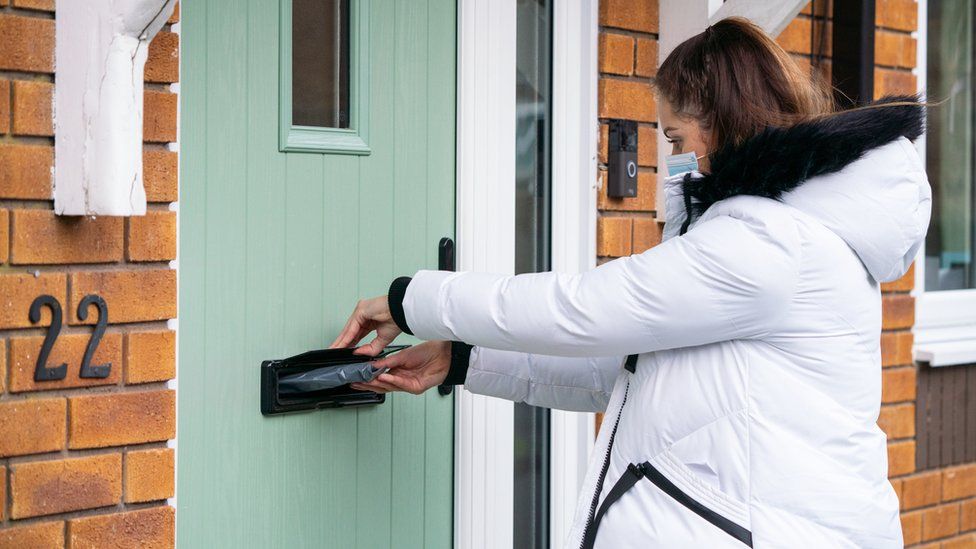Covid-19: 'Critical' those in South African variant test areas stay at home
 image copyrightPA Media
image copyrightPA MediaIt is "critical" that people in areas singled out for enhanced testing for the South African variant stay at home, the health secretary has said.
Matt Hancock told MPs those in affected postcodes should only go out when "absolutely essential".
On-the-spot doorstep tests, home testing kits and mobile testing units will be deployed in a number of areas.
The aim is to reach 80,000 people, amid fears the more infectious variant may be spreading in communities in England.
Gene sequencing has so far uncovered 105 cases of the variant, which - like the variant previously discovered in Kent - is thought to be more contagious although not more deadly.
Eleven of the cases of the South African variant had no link to foreign travel, prompting concerns it is spreading in the community.
Dr Susan Hopkins from Public Health England said the existing vaccines may offer less protection against the South African variant, although they still offer a good level of immunity.
"Surge testing" means that over-16s who live or work in these areas will be asked to take tests whether or not they have symptoms:
- Parts of the W7 and W13 postcode areas in Hanwell and West Ealing in west London
- Parts of the ME15 postcode area in Kent
- Parts of the WS2 postcode area in Walsall in the West Midlands
- Parts of the GU21 postcode area in Woking, Surrey
- Parts of the PR9 postcode area in Southport
- The CR4 postcode area around Pollards Hill in south London
- Tottenham Hale in the N17 postcode area of north London
- The EN10 postcode area in Broxbourne
In most of the areas, home testing kits are being delivered and collected, while some are also providing mobile testing sites. The tests will be PCR ones, which involve swabbing the nose or throat and are regarded as the most reliable.
The health secretary told the Commons: "We have also seen 11 cases of mutations of concern in Bristol and 32 in Liverpool, and are taking the same approach.
"In all these areas it is imperative that people must stay at home and only leave home where it is absolutely essential."
"When your local authority offers you a test you should take up the offer because we know that around one in three people with coronavirus have no symptoms but can still pass it on," he added.

- NEW VARIANTS: How worried should we be?
- VACCINE: When will I get the jab?
- LOCKDOWN TIPS: Five ways to stay positive
- TEST AND TRACE: How does it work?

Meanwhile, travellers arriving in Scotland from abroad may be asked to quarantine in a hotel to minimise the risk of new variants entering the country, First Minister Nicola Sturgeon has said.
She told MSPs her government intended to introduce a "managed quarantine requirement" for anyone who arrives directly into Scotland, regardless of which country they have come from.
The first minister added that she could not "unilaterally" impose these restrictions on people landing elsewhere in the UK and travelling to Scotland, but hoped the other administrations would work with the Scottish government to reduce the number of people doing so.
The policy goes further than the new quarantine system for England, which is due to be introduced in the coming weeks and only requires those arriving from countries under travel bans to isolate in hotels.
Labour has called for hotel quarantine to apply to all UK arrivals.
In December, the discovery of the new strain prompted a ban on foreign nationals travelling into the UK from South Africa and later from southern African countries.
Under current restrictions, people arriving into England from anywhere outside the UK, Ireland, the Channel Islands or the Isle of Man need to isolate at home for 10 days and provide a negative Covid test result before travel.
According to the Times, the government's Scientific Advisory Group for Emergencies (Sage) warned Downing Street that only closing the borders or introducing mandatory quarantine for all would stop new variants entering the UK.
But a government source told the BBC the report was "not accurate" and the prime minister "was not advised to stop all travel".

- CHINA AND THE PANDEMIC: The gulf between what Chinese officials knew and what they told the world...
- FOOTBALL, RACISM AND ME: Anton Ferdinand explores racism in the game from a personal perspective



No comments